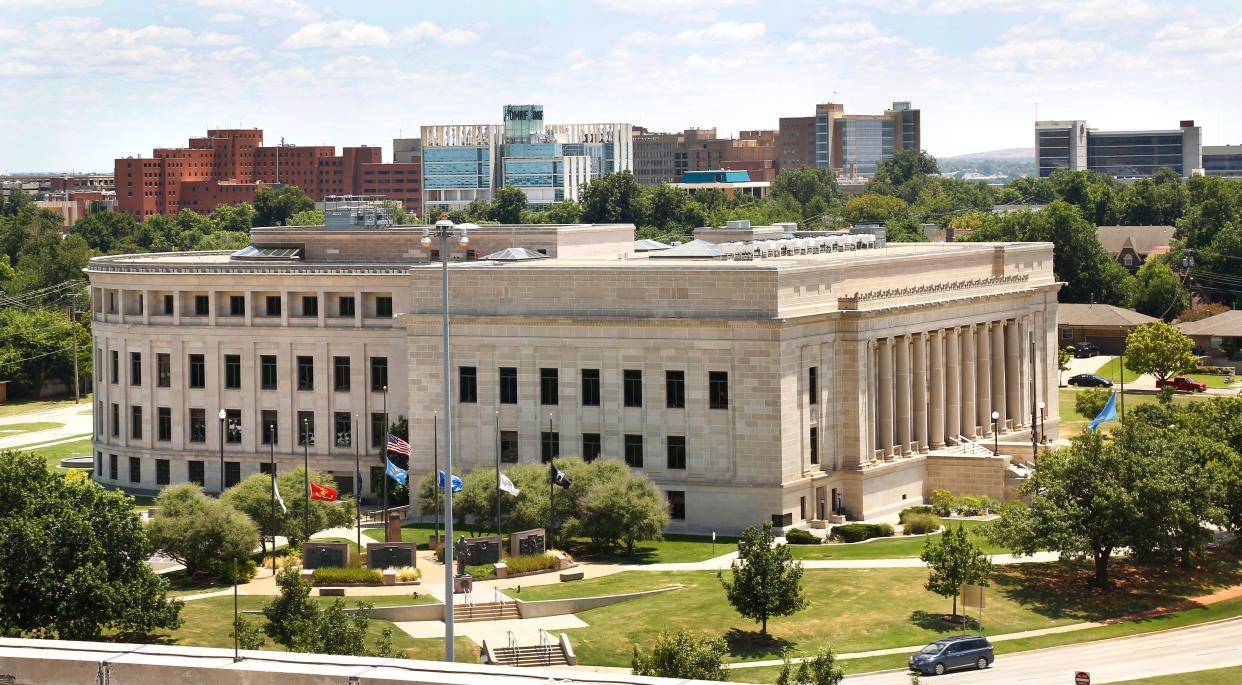Oklahoma voters could be asked to change state Supreme Court nominating process

- Oops!Something went wrong.Please try again later.
Oklahoma voters could be asked to change the way state Supreme Court judges are selected, giving the governor more control over the process through a system that mirrors the one used at the federal level.
Senate Journal Resolution 43, which was advanced earlier this year by the state Senate before being sent back by the House, proposes numerous changes to the state's legal system, including a move to make county judge elections partisan and to give the state Legislature power over law licenses for some attorneys.
But the resolution, if advanced in the final weeks of the legislative session, is expected to be amended to include just the provision that would remove an independent review panel from the state Supreme Court nominating process, according to two legislative staff members who were allowed to speak on the condition of anonymity in order to discuss private conversations among legislative leaders.
If approved by the state Legislature and governor, the measure would then be put to a statewide vote.
“I would bet my bottom dollar that Supreme Court nominations would become based on nothing but partisanship and personal friendship if this were to pass,” said Cathy Christensen, a past president of the Oklahoma Bar Association, who wrote a letter this week to each county bar president urging them to lobby against the measure.
The current nominating process starts with the Judicial Nominating Commission, a 15-member body established by voters in 1967 following a scandal that resulted in the criminal convictions of two Supreme Court justices and the impeachment of another justice.
Six attorneys serve on the commission, selected by Oklahoma Bar Association members. Another six non-attorneys are appointed by the governor, along with a non-attorney appointment by the Senate pro tempore, the House speaker and the rest of the commission.
The committee reviews judicial applicants and provides the governor with three names to choose from when an opening comes on the state Supreme Court.
SJR 43 would allow the governor to select any person they want for the state's highest court, but would likely require a confirmation vote from some type of legislative committee.
“Right now, an unaccountable board essentially tells the governor what to do when it comes to selecting judges for the Supreme Court,” said A.J. Ferate, an attorney and candidate for chair of the Oklahoma Republican Party who supports abolishing the Judicial Nominating Committee. “The governor is restricted; he is handcuffed in who he can select.”
Gov. Kevin Stitt has appointed three Supreme Court justices during his first term in office, with his last tipping the court to a majority of justices appointed by Republican governors.
However, Senate Pro Tem Greg Treat, R-Oklahoma City, the resolution's author, has complained about laws being overturned in recent years by the state Supreme Court.
Does the Oklahoma Supreme Court skew left?
In a state with a Republican governor and Republican majorities in both the state House and Senate, the state Supreme Court has, at times, been the only limit on the party's power.
Last year, the state Supreme Court ruled against Stitt in his effort to implement a Medicaid managed care system.
Stitt also lost a case over his attempt to sign new tribal gaming compacts.
The court also blocked three anti-abortion laws last year, overturned a law capping non-economic damages in personal injury lawsuits in 2019, and ordered the removal of a 10 Commandments monument from the state Capitol grounds in 2015.
It may not be surprising to see some laws overturned by the court as Oklahoma's Supreme Court is relatively liberal compared to the overall electorate, according to a 2017 study by Brian Fitzpatrick, a law professor at Vanderbilt University.
Fitzpatrick researched campaign donations made by judges, their party registration and which primaries they most often voted in to try and determine political ideology. He then compared those results to which political party voters more often supported and found that Oklahoma had the 12th-highest liberal skew of its appellate judges in the nation.
While supporters of the judicial nominating committee say the vetting process is nonpartisan, Fitzpatrick argued partisan viewpoints are still likely to seep through, especially since the legal profession tends to lean more liberal.
"If you ask a very liberal group of people to pick judges, you are probably going to get liberal judges," Fitzpatrick said.
"So the question becomes, if a state is really Republican, like Oklahoma, are the people in that state entitled to laws that are really conservative? Those people that believe very strongly in democracy would say that the people should be getting the kinds of laws that reflect their values."
Free of partisan politics?
Christensen, the former Oklahoma Bar Association president, said the state's legal community has been active in reaching out to lawmakers to discourage the measure.
She doesn't see a need to "change a system that is working," especially since it was put in place after illegal conduct among justices.
"The two words you won't hear throughout the process is 'Republican' or 'Democrat' because it truly is a nonpartisan process," Christensen said.
The Oklahoma Association for Justice and the League of Women Voters of Oklahoma also have advocated against the resolution.
“There is no valid reason to destroy a judiciary that is relatively free of partisan politics and replace it with political appointees,” the League of Women Voters of Oklahoma said in an email sent out earlier this week.
This story is provided in part through a grant by the Kirkpatrick Foundation. To support work like this, please consider purchasing a digital subscription today at https://cm.oklahoman.com/specialoffer/.
This article originally appeared on Oklahoman: Bill seeks change in Oklahoma Supreme Court nominating process

